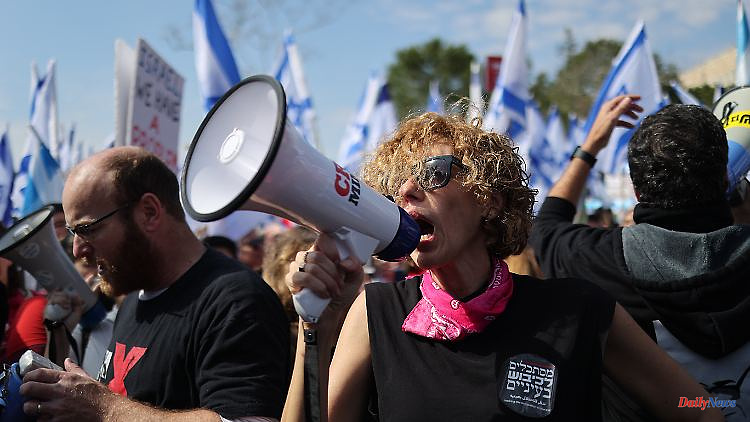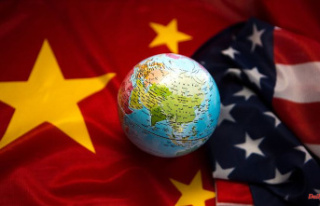President Herzog warns of the collapse of Israel. Tens of thousands took to the streets against a change in the law intended to weaken the Supreme Court. The Knesset is unimpressed - it is waving through part of the amendment. Tensions in the country are increasing.
According to media reports, around 90,000 Israelis protested against the planned judicial reform in front of the parliament in Jerusalem. The demonstrators, who had come from different parts of the country, waved Israeli flags and held up protest signs. "We're saving democracy," read one of them. Further protests erupted across the country. Members of many professions took part in a strike.
Despite opposition, the Knesset Judiciary Committee approved part of the controversial reform. A total of three readings in Parliament are required for a change in the law. During the debate in the committee there were tumultuous scenes. Opposition members loudly protested, jumping over tables and shouting "shame, shame, shame!" over and over again. Shortly thereafter, they were dragged out of the room by folders. A deputy from the opposition party Israel Beitenu burst into tears over the situation.
Tel Aviv Mayor Ron Chuldai caused a stir with sharp statements. "Dictatorships only become democracies again through bloodshed," he said at a protest march. "This is the history of the world. Countries have turned into dictatorships with the help of democracy and unfortunately we have seen terrible things, including those that we have suffered as a people."
For weeks, tens of thousands of Israelis have been demonstrating against Benjamin Netanyahu's government's plan to deliberately weaken the Supreme Court. The aim of the reform is to give Parliament the power to overrule decisions of the Supreme Court with a simple majority. Politicians should also be given more influence in the appointment of judges. Critics see this as a threat to the democratic separation of powers.
Because there is no written constitution in Israel, the Supreme Court is of particular importance in upholding the rule of law and human rights. The right-wing religious government, however, argues that the court currently wields too much political influence. In view of the extreme tensions between the two camps, President Izchak Herzog warned of a constitutional and social collapse in Israel in a speech on Sunday evening: "We are only a few moments away from a clash, maybe even a violent one." He called for a dialogue between both sides and a compromise.
Meanwhile, a 22-year-old Palestinian was killed during an Israeli military operation in Nablus in the West Bank. According to the army, two suspected assassins were caught in the raid. They are suspected of shooting dead an Israeli soldier in the West Bank in October. After a rocket attack from the Gaza Strip, the Israeli Air Force shelled an underground complex on Monday night.
According to the army, this house housed raw materials for the production of rockets for the Islamist Hamas organization, which rules in the Gaza Strip. During the night, four more rockets were fired from the Gaza Strip at Israel. The security situation in Israel and the Palestinian territories has been extremely tense for weeks. Nine Israelis and one Ukrainian have been killed in Palestinian attacks since the beginning of the year.
Raids by the Israeli army and their own attacks killed 47 Palestinians this year alone. Israel's security cabinet decided on Sunday evening to legalize nine unauthorized settlement outposts in the occupied West Bank in response to the attacks. Egypt and Jordan condemned the decision.
Israel conquered the West Bank and East Jerusalem in 1967. In total, more than 600,000 Israeli settlers live there today. The Palestinians claim the territories for an independent state with East Jerusalem as its capital. Israel distinguishes between settlements created with government approval and "wild settlements," which are intended to be retrospectively legalized by law. From an international perspective, however, all settlements are illegal.












